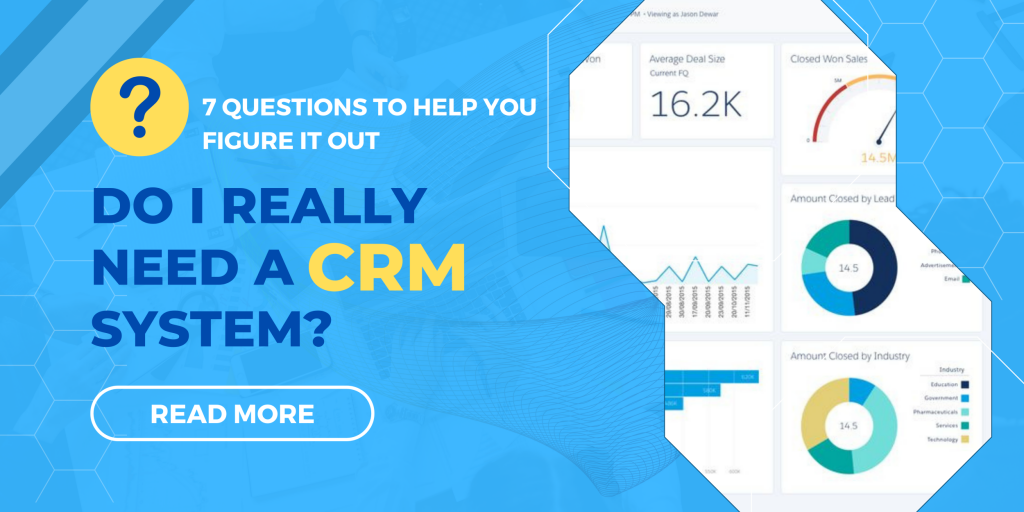
Do I need a CRM system to grow sales ROI and when? 7 questions to help you figure it out

Feeling like your sales, marketing and customer service efforts have become so chaotic that your business is missing good opportunities to grow further?
The bigger the company, the more it faces this challenge. For example, when the US bank Wells Fargo is responsible for tracking $1.9 trillion in assets and serving 70+ million customers, it has no other choice but to put things in order and use a customer relationship management (CRM) system to efficiently store client information and keep all its services in sync. This way the financial institution saves tons of time and money, while creating systems that fuel innovation and business growth.
The market leading CRM platform Salesforce also discovered that 70% of its customers saw an improvement in time to realise ROI after implementation. This is not a bad number but it’s also not 100%.
While in most cases a CRM system can certainly help you improve customer relationships, alignment between departments, operational efficiency, and ultimately ROI, sometimes the organisation is just not ready yet. There is a time when we can no longer succeed without such a system, but there is also a period when we can totally survive without one.
That said, when is the right moment to get a CRM? How do you know if you actually need it now?
Over the past 12 years, the Next Consult team has helped 200+ clients to optimise their business processes, define proper requirements for business software implementation (RFP) and successfully implemented 100+ CRM projects and dozens of ERP and BI projects. Their experience taught them that there are several questions that should be answered before the choice for a software solution is made.
#1 Do I have clear business goals and processes?
First of all, business goals, needs, and processes must be properly defined. This can be tricky if you’re doing it for the first time, so don’t hesitate to call an external expert to give you a hand. Because at the end of the day, if you don’t know where you’re going and how, it’s unlikely you’ll reach the desired destination. Before you start choosing a software solution, analyse what you want to achieve and why. Then, the CRM tool can help you realise this business growth strategy by enabling greater work efficiency and effectiveness.
#2 Is knowledge about our customers all over the place (and does it stop me from making decisions)?
If your customer and prospect data is spread across spreadsheets, paper notebooks and the heads of employees, then you face the significant risk of losing potential revenue due to the loss of information. It might be manageable when you have 5 customers, but (don’t) try with 500! Without a single source of truth, it’s also likely that customer needs will be misunderstood and you will send wrong messages or even use the wrong channels. When all the knowledge about the customer is consolidated in one place, it becomes much easier to track every change and communicate in a way that actually resonates with its audience.
Who’s our ideal customer? Are we on track to hit our sales targets? Can my organisation handle 100 or 1000 new customers and scale efficiently? Should we change our communication style? What is the path forward? All these and many other strategic questions require a data-driven approach, so if you’re struggling to find and organise quality data, maybe you should consider a CRM system.
#3 Has communication between marketing, sales, and customer service become too challenging?
Building on the previous point, have you heard the phrase "the left hand does not know what the right hand is doing"? You have probably witnessed disagreements between the Sales Manager and the Marketing Manager about the effectiveness of a campaign, how many leads are generated, whether they are of good quality or not, etc. Or you have witnessed a situation in which a sales rep has given a bigger discount to a client without the approval of their manager, and the manager found out about the case when the contract has already been signed with the client and orders have even been made.
Where a CRM system really excels is in the transfer of information between departments, at scale.
#4 Am I unable to track the effectiveness and ROI of marketing campaigns?
Investing in a marketing campaign and seeing it doesn’t result in any generated leads is sad. However, with this data, you can at least adapt your strategy and tactics. Without a CRM, you may see that your blog posts get lots of reads and likes but are they actually attracting the right audience? Is this effort somehow helping your sales team and revenue growth or is it just a vanity activity that looks good but has no impact on your organisation’s bottom line?
#5 Am I struggling to prioritise an increasing number of leads?
As a company gets into the fortunate position to be attracting more and more customers, at some point comes the realisation that while many people would be interested to learn more about your solutions, a big fraction of them never intended to make a purchase. Or had a different need. Or never had the budget. Yet, if the sales teams talk to everyone, they will never have time to actually close deals. Here comes the concept of lead qualification and a CRM system can most certainly help you prioritise and focus on the customers that are most likely to convert.
#6 Do we need a tool to help us offer personalised offers, customer service and communications?
Nowadays, a personalised experience is the ultimate way for a business to stand out from competitors. Being able to provide individualised communication to customers - wherever and whenever they need - is essential but it becomes difficult to manage as a business grows beyond its first few clients. A CRM system can be helpful across several dimensions. First of all, it can give you better visibility across the customers’ journey and their current status and experience. Of course, then, you can use this data to deliver highly engaging communications and a service that lives up to the expectations of your customers. Or even provide personalised offers, special discounts, and custom solutions based on the definition of different customer segments.
Furthermore, if your organisation spends its time reacting to customer complaints and dealing with random fires, then it wouldn’t have the capacity to proactively focus on growth. Better to prevent a problem before it happens, then you will have the resources to focus where it really matters.
#7 Am I ready to invest in people training?
To use a CRM system effectively, all users must like it and know how to work with it. In order for them to like it, engage them from the very beginning and let this be their "child". So that they know how to work with it and make their work easier, not more difficult, TRAIN THEM WELL!
If after this article you think you need a CRM system for your business, there is another important decision to be made: Which one to choose and how? Our next article will focus on this topic. Meanwhile if you’re considering a CRM implementation and you need advice on how to choose the business software that will help you achieve your goals, you can reach out to Next Consult and count on our experienced team.
Read more in our Case Studies.





